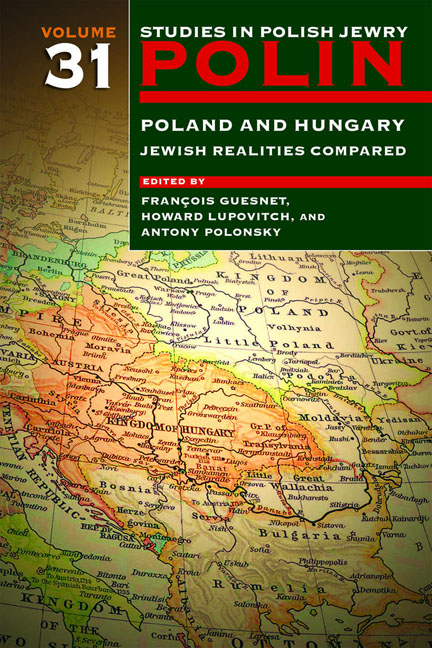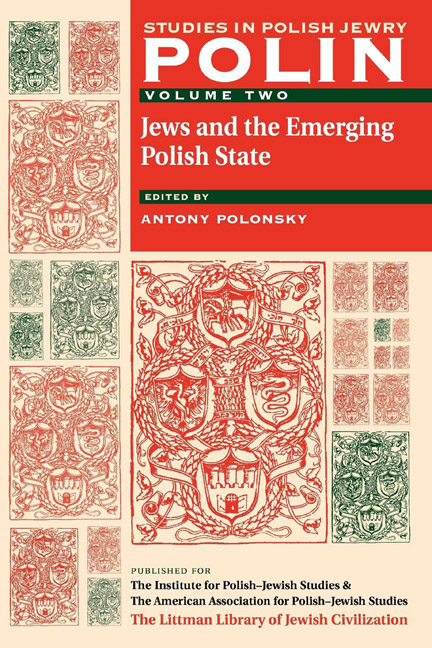Refine search
Actions for selected content:
133 results for Polin
Title match
Polin
-
- Book:
- Jews in Early Modern Poland
- Published by:
- Liverpool University Press
- Published online:
- 19 December 2019
- Print publication:
- 01 November 1997, pp ix-x
-
- Chapter
- Export citation
Title match
Polin
-
- Book:
- From Shtetl to Socialism
- Published by:
- Liverpool University Press
- Published online:
- 19 December 2019
- Print publication:
- 01 December 1993, pp v-v
-
- Chapter
- Export citation
Title match
Polin
-
- Book:
- Jews, Poles, Socialists: The Failure of an Ideal
- Published by:
- Liverpool University Press
- Published online:
- 23 November 2019
- Print publication:
- 06 March 2008, pp ix-ix
-
- Chapter
- Export citation
Title match
Polin
-
- Book:
- Jews and the Emerging Polish State (Polin Volume Two)
- Published by:
- Liverpool University Press
- Published online:
- 03 December 2019
- Print publication:
- 06 March 2008, pp xi-xii
-
- Chapter
- Export citation
Title match
Polin
-
- Book:
- Poles and Jews: Renewing the Dialogue
- Published by:
- Liverpool University Press
- Published online:
- 28 November 2019
- Print publication:
- 01 July 2004, pp xi-xii
-
- Chapter
- Export citation
Title match
Polin
-
- Book:
- Focusing on Jewish Popular Culture and Its Afterlife
- Published by:
- Liverpool University Press
- Published online:
- 23 November 2019
- Print publication:
- 01 November 2003, pp ix-ix
-
- Chapter
- Export citation
Title match
Polin
-
-
- Book:
- Polin: Studies in Polish Jewry Volume 31
- Published by:
- Liverpool University Press
- Published online:
- 11 July 2020
- Print publication:
- 19 December 2018, pp ix-ix
-
- Chapter
- Export citation
Title match
Polin
-
- Book:
- The Jews of Warsaw
- Published by:
- Liverpool University Press
- Published online:
- 23 November 2019
- Print publication:
- 01 August 2004, pp xi-xi
-
- Chapter
- Export citation
Title match
Polin
-
- Book:
- The Shtetl: Myth and Reality
- Published by:
- Liverpool University Press
- Published online:
- 23 November 2019
- Print publication:
- 25 November 2004, pp ix-ix
-
- Chapter
- Export citation
Polin: Studies in Polish Jewry
-
- Book:
- Jews, Poles, Socialists: The Failure of an Ideal
- Published by:
- Liverpool University Press
- Published online:
- 23 November 2019
- Print publication:
- 06 March 2008, pp x-x
-
- Chapter
- Export citation
Polin: Studies in Polish Jewry
-
- Book:
- Polin: Studies in Polish Jewry Volume 31
- Published by:
- Liverpool University Press
- Published online:
- 11 July 2020
- Print publication:
- 19 December 2018, pp x-x
-
- Chapter
- Export citation
Polin: Studies in Polish Jewry
-
- Book:
- From Shtetl to Socialism
- Published by:
- Liverpool University Press
- Published online:
- 19 December 2019
- Print publication:
- 01 December 1993, pp vi-vi
-
- Chapter
- Export citation
Polin: Studies inPolish Jewry
-
- Book:
- The Shtetl: Myth and Reality
- Published by:
- Liverpool University Press
- Published online:
- 23 November 2019
- Print publication:
- 25 November 2004, pp x-x
-
- Chapter
- Export citation
Polin: Studies in Polish Jewry
-
- Book:
- Jews and the Emerging Polish State (Polin Volume Two)
- Published by:
- Liverpool University Press
- Published online:
- 03 December 2019
- Print publication:
- 06 March 2008, pp x-x
-
- Chapter
- Export citation
Polin: Studies in Polish Jewry
-
- Book:
- Focusing on Jewish Popular Culture and Its Afterlife
- Published by:
- Liverpool University Press
- Published online:
- 23 November 2019
- Print publication:
- 01 November 2003, pp x-x
-
- Chapter
- Export citation

Polin: Studies in Polish Jewry Volume 8
- Jews in Independent Poland, 1918–1939
-
- Published by:
- Liverpool University Press
- Published online:
- 16 July 2020
- Print publication:
- 01 December 1994
-
- Book
- Export citation

Polin: Studies in Polish Jewry Volume 31
- Poland and Hungary: Jewish Realities Compared
-
- Published by:
- Liverpool University Press
- Published online:
- 11 July 2020
- Print publication:
- 19 December 2018
-
- Book
- Export citation
Le Libéralisme. Espoir ou périlRaymond Polin et Claude Polin Paris: La Table ronde, 1984, 370 p.
-
- Journal:
- Canadian Journal of Political Science/Revue canadienne de science politique / Volume 19 / Issue 1 / March 1986
- Published online by Cambridge University Press:
- 10 November 2009, pp. 203-205
-
- Article
- Export citation

Jews and the Emerging Polish State (Polin Volume Two)
-
- Published by:
- Liverpool University Press
- Published online:
- 03 December 2019
- Print publication:
- 06 March 2008
-
- Book
- Export citation
